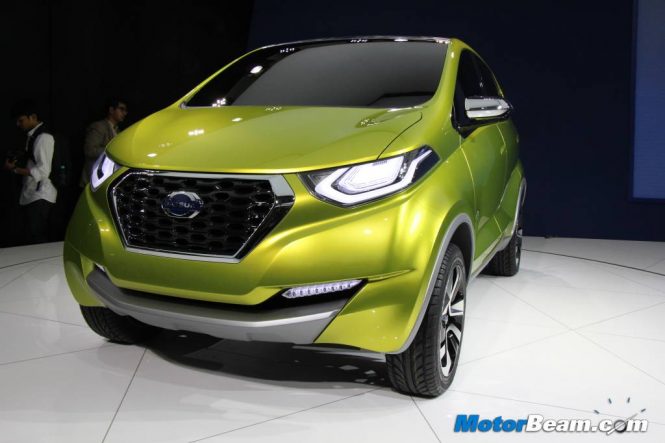We had a 1 hour long roundtable interview with Vincent Cobee – Corporate Vice President, Global Head of Datsun at Nissan’s headquarters in Yokohama, Japan. Here is a summary from the interview.
1) On Datsun Not Performing Upto Expectations – The company is in for the long run and is happy with the progress made although it could have done better. Datsun is a new brand and brands aren’t built over night but take time and the Japanese automaker is fully committed to delivering value to middle-class buyers, its main target audience.
2) On Datsun GO Safety – A huge number of people die on Indian roads every year but 85% are not in a car. Thus, out of the 15%, the majority cause for accidents are poor driving, lack of skill and visibility. Thus adding airbags is not the solution to the problem, rather preventing accidents is. The Datsun GO has the best in class visibility, comfort, braking and lights, the company claims. A driver side airbag is available on both the GO and GO+ but the automaker wants to prevent accidents and has focussed on active safety for the same.
Furthermore, in South Africa, where currently only the GO is on sale, Datsun has installed driving simulators in its dealerships. Thus a new car driver is trained two-thirds on a simulator and the rest on the road, Datsun helps the person get the driver’s license. If the prospective buyer turns into a Datsun customer, his license fees becomes free and if he doesn’t, he ends up paying half of what it would have cost him otherwise. A similar plan for India is under consideration.
3) On The Lack Of ABS – ABS reduces braking distortion but doesn’t shorten stopping distances, it in fact increases them. Datsun has equipped the GO models with strong brakes and the cost at which ABS comes, it doesn’t add value to the car. The company sells the GO in South Africa without ABS too and the model sold has similar specifications as India, with the Chennai facility exporting it.
4) On AMT and Automatic Transmission For Datsun Cars – There are 4 types of automatics – torque converter, dual clutch, CVT and AMT. Traditional torque converters offer decent performance but at the cost of efficiency while dual clutch are efficient and quick performers but are expensive and high on maintenance. CVT is a good option and the Nissan Micra already uses it on the same engine but it will be much more costly if used on the GO models. AMT is interesting as it comes at one-third the price but Mr. Cobee feels AMT isn’t here to stay for long and the shift quality in stop-go traffic robs away the driving feel. Thus Datsun isn’t looking at equipping its cars with AMT in the near future although it is still considering it.
5) On Alternative Fuels – The small car segment is primarily a petrol dominated market and the advantage of diesels has shrunk in the past few years due to three reasons – reduced subsidy cost (difference between diesel and petrol fuels has reduced drastically), increased cost of diesel engines (due to higher emission regulations) and improved petrol engines (as manufacturers have realised the scope of downsizing leading to improved economy while not decreasing performance).
Given the usage of this segment of buyers, he would never recover the premium paid for a diesel engine in the life time of the car. Meanwhile CNG could be offered but not as a factory fitment but rather an aftermarket one at the dealer level.
6) On Datsun’s Strategy – To offer customers a lifetime experience. The company is working on further improving the service experience and has finance options for buyers, even for accessories which have been offered since day one at the dealer level. The accessories are offered at competitive prices and not at a premium over after market options. All Datsun dealers have the cost of ownership mentioned on the wall to keep buyers in the know.
7) On Future Models – Datsun promised to launch 3 models in 3 years. It launched the GO in 2014, GO+ in 2015 and the redi-GO is the next launch, with the production model likely to be unveiled at the 2016 Auto Expo. Future model could be a crossover which would be a lifestyle vehicle rather than an adventure one. The company plans to fulfil the needs and ambitions of middle-class car buyers in emerging markets like India and Russia.
8) On Geographical Expansion – Currently present in four countries (India, South Africa, Indonesia and Russia), Datsun plans to expand to neighbouring countries. Already entered Nepal and will further expand into other African markets and Asian countries including Sri Lanka and Pakistan. Datsun would like to enter the Latin American market in the far off future and not immediately.

